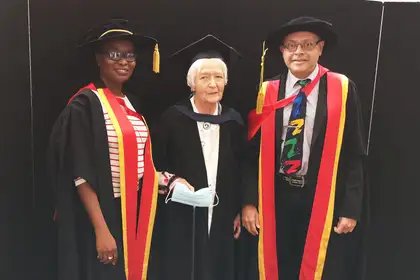
Left to right: Dr Eziaku Rasheed, Margaret Stefanitsis, and Dr Naseem Ameer Ali.
After graduating with a Master of Construction Law in May, Margaret intends to continue feeding her hunger for knowledge as she begins her next step into doctoral studies.
Before Margaret’s retirement, she was a credit manager for a major company that supplied product to the construction industry, and had been intrigued by retentions. In late 2018, she decided that her retirement was the perfect opportunity to learn more.
“I knew retentions were an increasing project risk causing considerable monetary loss for subcontractors when the head contractor failed but knew little else. I contacted Massey and they referred me to Professor Naseem Ameer Ali who suggested doing a paper on Advanced Construction Law.”
Intending to only do one paper, Margaret confesses she was bitten by the study bug. She says she enjoys the thrill of learning and is now determined to continue studying for as long as she’s able.
“The stimulus of the study and the synergy with the students was beyond my wildest dreams. There was always a willing helper, and what amazed me most was the extraordinary support I received from Massey’s academic staff. They’re so in tune with their students, willing them to succeed, and in my case, inspired me not to give up.”
Margaret’s passion for continuing education has been lifelong, though her academic journey began out of necessity.
With only a rudimentary secondary education of two years, Margaret entered the workforce with thoughts of going into nursing. After meeting her husband-to-be and marrying young, Margaret took on a different adventure – motherhood, as she raised her daughter Anne.
After returning to the workforce, Margaret spent ten years at a pharmaceutical manufacturing laboratory at Otago University, where she thoroughly enjoyed engaging with the students coming through and was inspired by their thirst for knowledge.
Margaret then went on to run a series of small food businesses with her husband Spiridon, also known as Steve, for just over ten years until he became chronically ill.
“My son-in-law Bruce suggested that if I was to become the bread winner, I would need to be better educated to have any quality of life financially. I began with correspondence school, studying accounting at school certificate level then university entrance. At that point my tutor suggested part-time university study. My family were very supportive, so I enrolled with Massey and began accounting papers in 1982.”
Margaret found studying extramurally tough, with assignments mailed out in envelopes, and knowing nothing more of her lecturers than their names on the assigned work. In 1987, she enrolled in Massey’s newly established Business Law Programme, and found herself enjoying this area of study.
Her grades improved, and she felt she was getting into her stride when her husband became seriously ill.
“I notified Massey of my withdrawal, but then I got a phone call from Associate Professor Roger Pitchforth, an international law lecturer who I’d never even met. He asked why I was withdrawing and after I explained, he offered to extend my assignment deadline. I was astonished by such kindness.
“Two weeks later, a large packet arrived with photocopied pages of the research I needed to complete my work, which Roger had arranged with the library. I was able to meet the extended deadline and never looked back after that.”
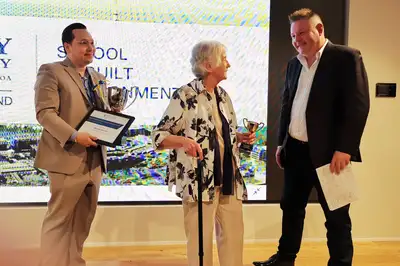
Margaret receiving her Postgraduate Excellence Award.
With her master’s under her belt and after being awarded a Postgraduate Excellence Award worth $8000 to go towards her PhD, Margaret now has her sights on doctoral studies. She hopes her proposed topic ‘Accessibility to Public Buildings for People with Mobility Impairments’ will see her help bring real change.
“My research will involve identifying the major accessibility problems people with disabilities face, and checking the current law to see whether these issues should not exist under current legislation.
“If the law is at fault, I want to work with those disadvantaged to make submissions to parliament for a law change when the new Accessibility Act is drafted. If the problem is non-compliance with the working law, I want to strengthen the regulatory authority surveillance to ensure the law is complied with.”
Margaret says the one thing she has learned about herself during this time is that age doesn’t matter, and that if you’re motivated, you can make significant change.
“Never think you can’t do it – but it’s important to remember no man is an island. If you need help, ask for it.”
Margaret says her family and her Massey whānau have been her island and her biggest source of support.
“My unbelievably patient daughter Anne recovers my lost work and tidies my awful formatting, my son-in-law Bruce and granddaughter Gemma are my go-to law libraries, and my grandson Scott provides me with the logic I lack.
“I could never have achieved what I did without the immeasurable help of my fellow classmates who have now become my friends. Most of all, I want to thank my lecturers and tutors who supported me throughout this incredible journey which is not yet near its end. Dr Naseem Ameer Ali most of all has guided me through this odyssey with patience, encouragement, and respect.”
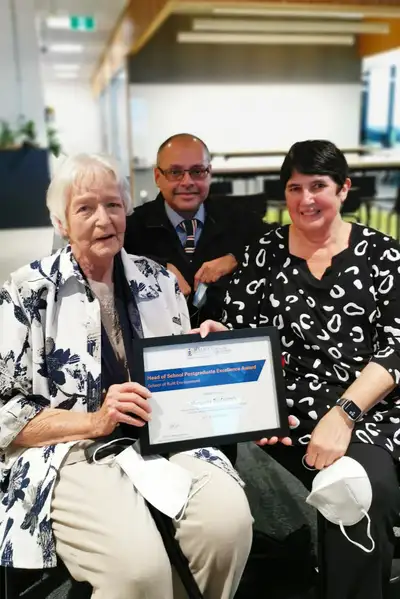
Margaret with Dr Naseem Ameer Ali and her daughter, Anne.
Related news
New book explores construction procurement
Professor Graham Squires from the School of Economics and Finance has published his sixth book with Routledge, entitled Construction Procurement: Complex Property Development.
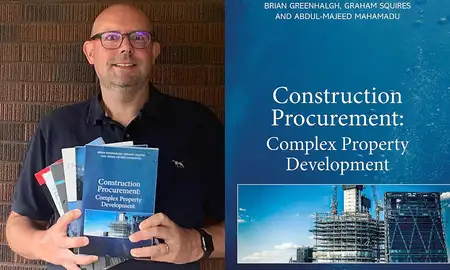
Historic buildings likely to be toppled under post-quake law, PhD finds
Recent PhD research from Massey University shows that the Building Amendment Act 2016 provides more logical reasons for demolition of historical buildings than preservation.
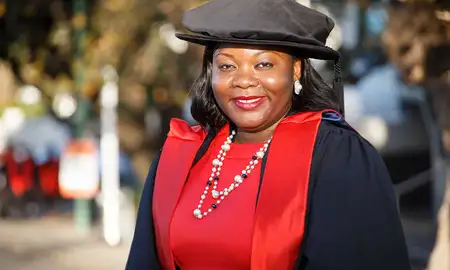
Massey launches new School of Built Environment
Unprecedented growth and success of the construction-related programmes at Massey University has led to the establishment of the School of Built Environment on the university's Auckland campus.
